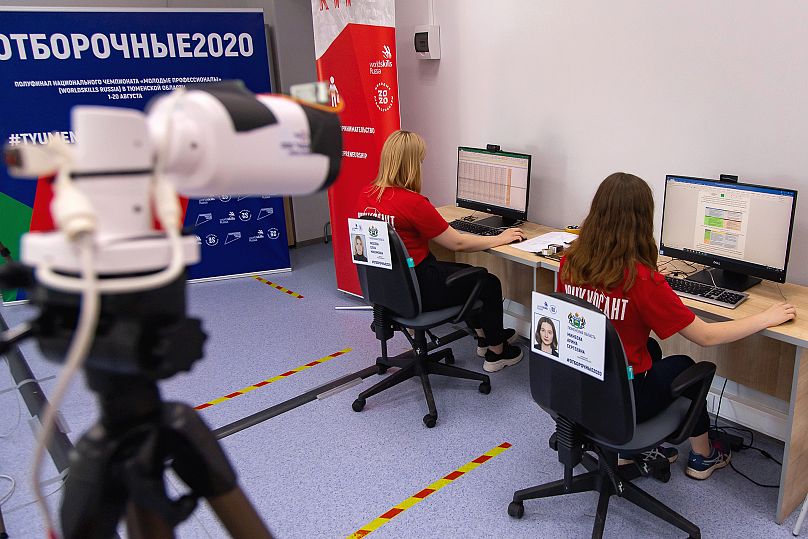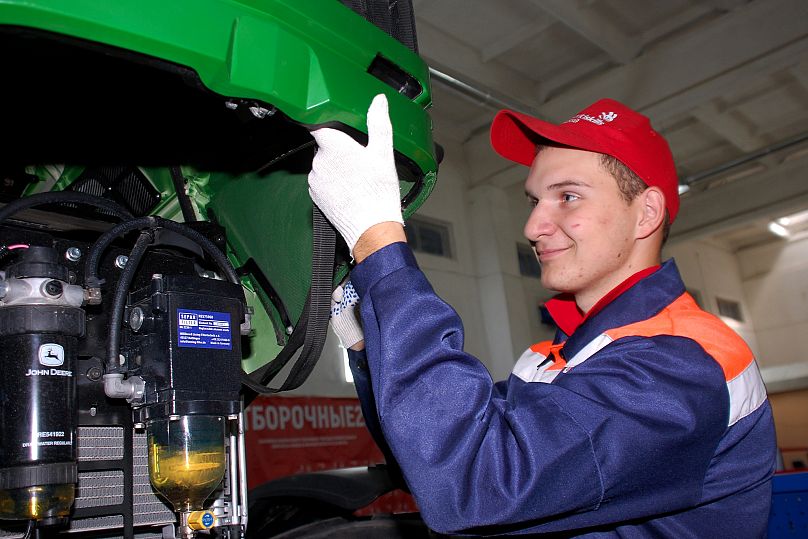The WorldSkills Russia National Competition takes place annually and brings outstanding students and trainers of technical and vocational education from around the country.
Now in its eighth year, in 2020 the competition will be the largest yet, with more than 2,800 participants, aged from 12 to 22, competing in skills from seven sectors – construction and building technology; creative arts and fashion; information and communication technology; manufacturing and engineering technology; social and personal services; transportation and logistics, and future skills.
“This period throws up great challenges for skills organisations all over the world,” says Ekaterina Loshkareva, WorldSkills International board member, Russia’s official delegate to the organisation and WorldSkills Russia deputy director general for R&D and the development of educational institutions. “And skills have proved to be essential: while the world was put on pause, essential workers kept it moving. WorldSkills Russia also kept moving ¬– we did not stop our activities but adjusted them to the current situation to support national technical and vocational institutions via existing and newly developed means. What we are doing in Russia is both our response to the global challenge and our contribution to the global skills development agenda. The pandemic will end, but the solutions will remain, and evolve.”
Working remotely for a wider reach
The competition, held from 6-21 September, in part owes its expansion to a new hybrid format, which will utilise distance and online technologies in addition to traditional onsite activities. This means that the event can accommodate many more participants, and increase the geographical possibilities for competitors, trainers, judges and spectators.
Reflecting changes in global ways of working and the growth of the digital economy, this transformation is the result of a collaborative effort. WorldSkills Russia has long been at the forefront of developing new methodologies, and was able to count on the support of the Ministry of Education, the regional government of Kuzbass, the Agency for Strategic Initiatives (ASI) and partners from 50 leading companies around the world.
WorldSkills Russia’s partners adapted to these new conditions and supported the movement. New digital platforms and tools developed by these companies have been used for education, training, independent assessment and competitions. Software company 1C launched new online training programs, for example, while electrical engineering company IEK helped a number of educational institutions to digitise their practice. Welding company Kemppi has launched a series of hands-on webinars for students, masters and leaders on how to adapt hands-on learning to a distance format. All of these new practices and tools were applied when assembling skills for this edition of the National Competition.
“A new reality is challenging the vocational education system,” said Robert Urazov, general director of WorldSkills Russia. “We are at a unique stage in its development. Despite serious changes in the external environment, we were able to quickly respond and adapt to new conditions and continued to build our work around practical training, which is essential to what we do. This was also due to effective networking with the expert community, which is flexible and adapts easily to change. Despite significant challenges, the vocational and education training system is stable and efficient in our country. The digitalization of the economy affects the development of vocational education, and our task is to be able to meet the challenges of the time and to help the system function under any conditions”.
Competitors, each of whom has been selected from regional finals and special qualifiers, will carry out their assigned tasks in selected educational centres all over Russia. These will be equipped with web cameras, so that supervisors can overlook the process and ensure strict adherence to competition regulations, and assessments will then also be carried out remotely. Practical work that cannot be assessed online will be sent to the competition management centre, this year located in the Kuzbass region, or the auxiliary centres located in Moscow and Kazan.
Also known as the Kemerovo Oblast, Kuzbass is an important region for heavy industry and metallurgy, and one of the largest and coal-mining centres in the world.
“Kuzbass is actively developing modern technologies and advanced work mechanisms to meet the highest international standards,” said Sergei Tsivilev, governor of the Kuzbass region. “The region needs high-level professionals, so it is especially exciting for us that Kuzbass has become the centr for the VIII WorldSkills Russia National Competition. This is a great opportunity to show young people the full range of the most popular working professions and give competition participants the chance to improve their skills. Spectators, too, will be able to learn more about those professions that will allow them to reveal their talents and abilities, and to fully realise their potential."
Simultaneous conference programme and educational activities
A conference program will take place in tandem with the competition, but this year will be held via remote broadcasts, using cutting-edge augmented reality technology. Webinars, online discussions and workshops will bring together participants and spectators from Russia and around the globe, as leading professionals and experts discuss the most recent developments and future strategies for training qualified professionals.
Experts from a wide range of fields will take part in the discussions, and speakers will include Minister of Education Sergey Kravtsov; Dmitry Peskov, President Putin’s special representative for digital and technological development; Minister of Science and Higher Education Valery Falkov, and Sergei Tsivilev.
The programme will include discussions around standards for workforce training; collaboration among WorldSkills Russia regional coordination centres; development of new skills; practical exams and how to ensure they adhere to the standards of WorldSkills Russia, and the implementation of ‘Ticket to the Future’ – an early career guidance project for schoolchildren.
As part of this project, remote programme Try-A-Skill will enable anyone to take a virtual tour and try their hand in various vocational spheres via game simulators and interactive assignments from mentors. Simultaneously, Russian schools will be given access to remote technology classes in which children can learn about different professions and perform simple tasks.
The agenda of the plenary session “Teleconference 2020-2030” includes issues linked to the development of the WorldSkills Russia movement, which showed itself capable of solving new and large-scale tasks and meeting the challenges of the future after the success of WorldSkills Kazan 2019.
A special programme for foreign partners will enable participants to exchange experiences in implementing digital and online solutions for skills competitions. Experts as guest competitors and observers from 40 countries all over the world are invited to attend the programme, which will take place online. It will include a session on the new competition and the use of digital solutions and online technologies; a virtual tour of the competition’s remote venues and management centres; a training session on independent test projects assessment, based on WorldSkills methodology, in a remote format using digital technologies; a business talk on cooperation and interaction with industrial partners and companies for organising online training and competition events, and sessions on the implementation of an online competition model in seven different skill sectors.
Within this programme, WorldSkills Russia will share their experience and tools to help foreign partners implement digital and online solutions into their own vocational systems.
“We always invite foreign participants to take part in our national competitions to exchange experiences and jointly create training standards and assessment systems. By holding the National Competition in a distanced format, we continue to effectively interact with partners at the same level. As part of the competition, we test newly developed technologies not only at our venues but also at the venues of partner countries, therefore improving them and adapting them to a particular national vocational education system. We get a great response from countries wishing to take part in our competitions and receive and implement new tools developed in the “laboratory” of WorldSkills Russia, which means that, Russian practices are being scaled up globally,” said Alina Doskanova, director of international relations at WorldSkills Russia and Russia’s technical delegate to WorldSkills International, WorldSkills Europe and WorldSkills Asia.
Find out more at https://worldskills.ru/final2020/en/main



